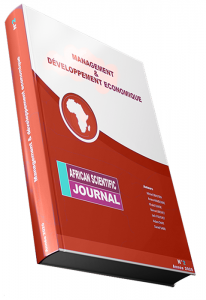Analyse des déterminants du rationnement du crédit à court terme de la PME marocaine
DOI :
https://doi.org/10.5281/zenodo.15925827Mots-clés :
rationnement du crédit, asymétrie d’information, déterminants, crédit à court terme bancaire, petite et moyenne entreprise (PME).Résumé
Résumé
Cet article traite le rationnement du crédit bancaire à court terme auquel sont confrontées les petites et moyennes entreprises (PME), un phénomène qui freine leur développement malgré leur rôle stratégique dans l’économie nationale. Il vise à analyser les déterminants de ce rationnement à travers une approche théorique.
Etant donné l’importance des crédits bancaires à court terme dans le financement de la trésorerie des PME. On a jugé opportun de mettre en lumière les principales théories abordant le financement bancaire, notamment l’asymétrie d’information et le rationnement du crédit. Nous proposons ainsi une analyse théorique du rationnement du crédit bancaire à court terme, fondée sur un raisonnement déductif de la théorie vers l’analyse.
Notre analyse théorique met en évidence que le rationnement du crédit bancaire à court terme des PME marocaines est influencé à la fois par des facteurs macroéconomiques (liquidité bancaire, exigences en fonds propres) et microéconomiques (taille, secteur d’activité, garanties, âge, relation bancaire, créances en souffrance…etc). En revanche le taux d’intérêt et le coût du crédit n’ont pas montré d’impact significatif sur cette contrainte durant la période 2014-2022, selon les données de Bank Al-Maghrib.
Mots clés : rationnement du crédit, asymétrie d’information, déterminants, crédit à court terme bancaire, petite et moyenne entreprise (PME).
Abstract
This article addresses the issue of short-term bank credit rationing faced small and medium-sized enterprises (SMEs), a phenomenon that hinders their development despite their strategic role in the national economy. it aim to analyze the determinants of this rationing through a theoretical approach.
Given the importance of short-term bank loans in financing the cash needs of SMEs, it seemed appropriate to highlight the main theories addressing bank financing, particularly information asymmetry and credit rationing. We therefore propose a theoretical analysis of short-term bank credit rationing, based on a deductive reasoning approch from theory to analysis.
Our theoretical analysis highlight that short-term bank credit rationing for Moroccan SMEs is influenced by both macroeconomic factors (bank liquidity, capital requirements) and microeconomic factors (firm size, sector of activity, collateral, age, banking relationship, non-performing loans, etc.). In contrast, interest rates and the cost of credit did not show a significant impact on this constraint during the period 2014-2022, according to data from Bank Al-Maghrib.
Keywords : Credit rationing, Information asymmetry, Determinants, Short-term bank credit, Small and medium-sized enterprise (SME)
Téléchargements
Publiée
Comment citer
Numéro
Rubrique
Licence
(c) Tous droits réservés African Scientific Journal 2025

Ce travail est disponible sous licence Creative Commons Attribution - Pas d'Utilisation Commerciale - Pas de Modification 4.0 International.





















